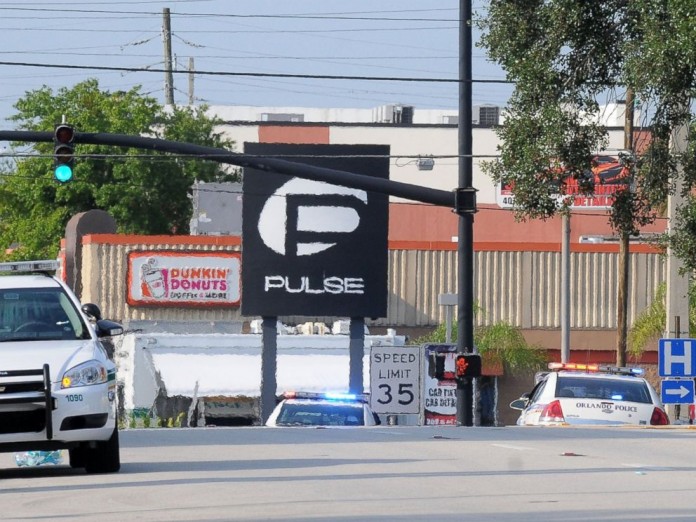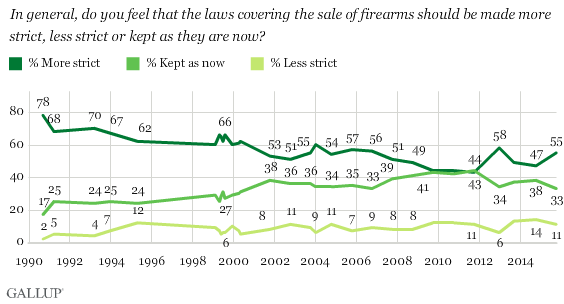
A review of the American public opinion context after the mass shooting in Orlando that left 49 dead and more than 50 wounded
What Do Americans Want to Be Done About Terrorism?
Americans strongly favor military options as effective ways to carry out the U.S. war on terrorism, and have minimal agreement that actions relating to restrictions on Muslims either entering the country or already in the country would be effective.
Gallup gave Americans a list of 11 proposals on dealing with terrorism in a survey conducted last December after the San Bernardino mass shooting, and asked them to indicate how effective they thought each would be in reducing terrorist attacks. The complete summary is here. The top four issues in terms of perceived effectiveness were increased military action against the Islamic State/ISIS, more restrictive visa policies on letting individuals come into this country, banning gun sales to individuals who are on the government’s «no fly» list, and sending more special operations forces to fight the Islamic State in the Middle East.
Among the lowest on the effectiveness list were two ways of asking about restricting Muslims from entering the U.S., proposals Donald Trump advanced and then reiterated in the wake of the Orlando shootings. Also near the bottom of the list is a proposal to require Muslims, including those who are U.S. citizens, to carry a special ID. These three are the only proposals tested that generate less than a majority of «very/somewhat effective» ratings.
Hillary Clinton on Monday called for a ban on assault weapons. Fifty-five percent of Americans think that making it harder to buy assault weapons would be effective in the war on terrorism, putting it below average on this list.
What Are American Attitudes About Gun Control?
A comprehensive review of American attitudes about gun control conducted after the San Bernardino shootings in December of last year highlighted a number of major conclusions about the public’s attitudes toward gun control.

What Priority Do Americans Give to Fighting Terrorism and Gun Control?
Gallup’s recent research shows that terrorism is one of the core issues Americans want the presidential candidates to address. When Americans are asked to say how important each of a list of 17 issues will be in determining their vote for president, terrorism and national security are higher in importance (45% «extremely important») than any other issue tested. When «extremely» and «very» are combined, terrorism and national security are one of four issues at the top of the list, along with the economy, employment and jobs, and education.
In response to an open-ended question asking Americans to name the single issue they believe will be most important for the next president to address, national security and defense come in fourth, with 9% of mentions (behind the economy, immigration and healthcare), while 5% specifically mention terrorism. Few Americans mention guns or gun control specifically.
Americans are less likely to mention terrorism in Gallup’s most recent monthly update (from early June) of their perceptions of the most important problem facing the nation. Four percent mention it specifically, with another 5% who say national security and defense and 2% who say «lack of military defense.» Only 1% mention ISIS and the Islamic State per se as the nation’s top problems.
At the same time, Gallup’s annual Mood of the Nation poll in January showed that Americans were increasingly worried about security from terrorism.
Gallup’s annual foreign policy poll conducted in February found that «international terrorism» ranked at the top of a list of 12 threats tested, with 79% of Americans viewing it as a «critical» threat.
Do Americans Differentiate Between Trump and Clinton on Handling Terrorism and Guns?
Trump has a slight four-percentage-point edge when Americans are asked whether he or Hillary Clinton would do the better job of handling terrorism and national security. The precise numbers are: Trump 50% and Clinton 46%, with 4% saying the two candidates would be the same or having no opinion. The American public has almost precisely the same reactions when asked to distinguish between Trump and Clinton on gun policy, with Trump at 50% and Clinton at 45%.
This near-parity on terrorism and guns contrasts with other issues on which Clinton wins handily, such as climate change and social issues, and those where Trump has a significant advantage, such as the federal budget deficit and the size and efficiency of the federal government.
The Republican candidate has enjoyed the advantage on the national security dimension in two of the three previous elections. In October 2004, three years after 9/11, George W. Bush had a 22-point advantageover Democratic nominee John Kerry as the better candidate to handle terrorism; and in October 2008, John McCain had a 16-point advantageover Obama. In the fall of 2012, however, the Democratic incumbent Obama had a 10-point advantage over Republican Mitt Romney.



Expositores: Oscar Vidarte (PUCP) Fernando González Vigil (Universidad del Pacífico) Inscripciones aquí. Leer más
Una retrospectiva para entender los próximos cuatro años. Leer más
En la conferencia se hará una presentación de los temas más relevantes del proceso de negociación se llevó a cabo desde el 2012, así como del acuerdo de paz firmado entre el Gobierno colombiano y la guerrilla de las FARC a finales del 2016. Se analizarán los desafíos y las... Leer más
El Observatorio de las Relaciones Peruano-Norteamericanas (ORPN) de la Universidad del Pacífico es un programa encargado de analizar y difundir información relevante sobre la situación política, económica y social de Estados Unidos y analizar, desde una perspectiva multidisciplinaria, su efecto en las relaciones bilaterales con el Perú.
© 2026 Universidad del Pacífico - Departamento Académico de Humanidades. Todos los derechos reservados.

